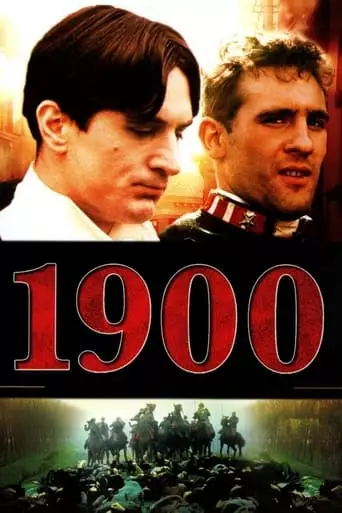
1900 (1976) Watch Online Free
The epic tale of a class struggle in twentieth century Italy, as seen through the eyes of two childhood friends on opposing sides.
1900 (Novecento), directed by Bernardo Bertolucci, is an ambitious Italian epic that spans over five hours, depicting the socio-political history of 20th-century Italy. The film is set against the backdrop of the country’s tumultuous history, following two childhood friends, Alfredo (Robert De Niro) and Olmo (Gérard Depardieu), who come from starkly different social classes. Alfredo is born into a wealthy landowning family, while Olmo is from a poor working-class background. Their friendship evolves over the years, intertwined with the shifting political climate, social struggles, and the impact of wars, as they grow into adults.
The story takes the viewer through their lives, from their childhood in the early 1900s to their experiences in the years following the World Wars. The film captures the extreme contrasts between the lives of the rich and the poor, exploring themes of class struggle, revolution, and the personal cost of social inequality.
1900 is a deep and complex exploration of Italy’s socio-political landscape, capturing the emotional and personal costs of political ideologies and class division. The film emphasizes the divide between the aristocracy and the working class, with Alfredo representing the former and Olmo the latter. One of the most striking aspects of the film is how it shows the effects of fascism and socialism on the characters and their communities.
The theme of friendship, despite the differences in social class, is central to the narrative. Alfredo and Olmo’s bond symbolizes a fragile hope for unity amidst the divisions of society. The film doesn’t shy away from showing the brutal realities of class warfare and the inhumanity of the aristocracy, particularly in scenes that depict violence against the working class and the exploitative nature of the upper classes.
The movie also delves into the characters’ evolution over several decades, showing their attempts to navigate a world in constant political flux. It explores how people from different social backgrounds confront the same issues of survival, revolution, and identity, offering a microcosm of the broader societal struggles that unfolded in Italy and Europe during the early to mid-20th century.
Another key theme is the personal cost of political engagement. As the characters experience the rise of fascism and the challenges of World War II, the movie asks whether political ideologies and loyalties can ever truly resolve the personal struggles faced by ordinary people.
Watching 1900 can leave you with a mix of emotions. The film’s sheer length and deep political themes can feel overwhelming, but its exploration of friendship, class struggle, and historical change will also provoke reflection. The viewer is likely to feel empathy for the characters, particularly for Olmo and the working-class figures, as they navigate a world of brutality and inequality. The movie’s harsh portrayal of social injustices may leave a lasting impact, stirring up feelings of frustration and sadness.
At the same time, the emotional weight of the film is balanced by its artistic beauty. The film’s stunning visuals and powerful performances will likely evoke admiration, making it a thought-provoking cinematic experience. By the end, you might find yourself reflecting on the nature of social inequality, the impact of history on individual lives, and the long-lasting repercussions of political ideologies.
In conclusion, 1900 is a monumental film that tackles heavy themes of class struggle, personal evolution, and political upheaval, offering both a personal and historical narrative. Though its length and complex storytelling may be a challenge for some viewers, its significance in cinema and its compelling performances make it a rewarding watch for those willing to engage with its intricate plot and themes.
